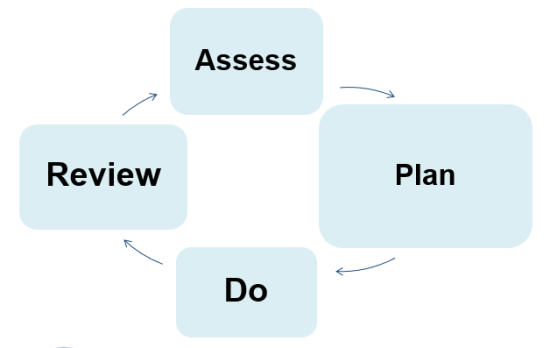The stages of the graduated approach 6-12 weekly cycle specific to early years
You should use the 'Assess, Plan, Do, Review' graduated approach to meeting children's needs as a continuous cycle. If a child isn't making expected progress, despite interventions matched to their needs, consider involving specialists, if they're not already involved. You should make this decision in partnership with the child's parents.
Assess, plan, review, do cycle diagram

Assess
The early years practitioner works together with a child's parents and the setting's SENCO to assess the child's needs. They should regularly assess the child to make sure the right support can be put into place. Where the child makes little or no progress, specialist assessment from outside professionals may be needed. Where outside professionals are not already working with the setting, the SENCO discusses this with the child's parents to get their agreement.
Plan
The child's parents, key person and SENCO agree: The outcomes they are seeking for the child. Target Monitoring Evaluation (TME) can be used, please see the Appendix for how to use it and the template. Interventions and support to be put in place. How they expect the interventions to impact upon the child's progress and a review date. Interventions should: Be strategies and support provided by practitioners with the relevant skills. Include a range of learning opportunities and differentiated activities to meet the outcomes identified for the child. All information should be captured in a Child SEND Support Plan, which includes a section on agreed outcomes and an individual provision plan.
Do
The practitioner, usually the child's key person, is responsible for supporting the child each day and putting in place the agreed interventions. The setting's SENCO should: Support the key person in assessing the child's response to the actions. Provide advice on how to implement the interventions effectivley.
Review
The setting works with the child's parents to: review the child's progress in line with the agreed date, evaluate the impact and quality of support (use TME to support this) agree any changes to the outcomes, depending on the child's progress. If outside professionals are involved, they should also be invited to attend regular reviews.